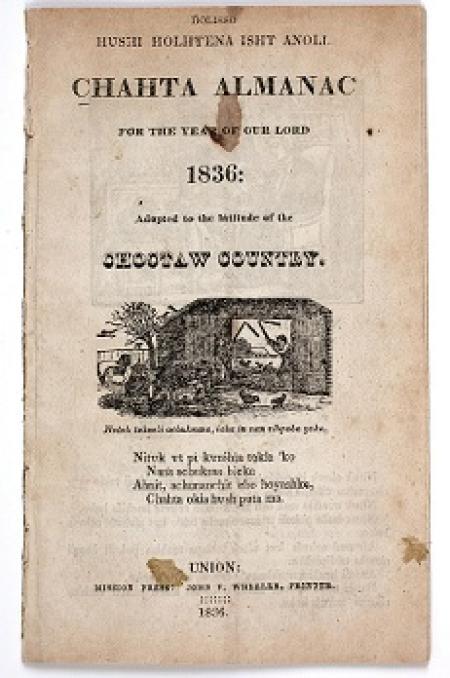
Holisso hvshi holhtena isht anoli, Union, Oklahoma, 1836. Catalog record
American Antiquarian Society
185 Salisbury Street
Worcester, MA 01609
United States
Led by Philip Round
Where does American Indian Literature come from? Most readers, when confronted with the category “Native American Writers” think immediately of best selling authors like N. Scott Momaday, Louise Erdrich, Sherman Alexie, and Leslie Silko. Such authors are often praised for being “almost unbearably authentic” (as the cover of Momaday’s House Made of Dawn suggests), and are often treated as though they somehow hover above the materialist fray that is the world of publishing and books. Native books are “authentic,” presumably, because they offer a direct line to an oral tradition, rendering it legible for outsiders to view.
The AAS Summer Seminar for 2013 will explore how writers like Erdrich and Momaday have actually emerged from tribal literary traditions that are comprised of a whole range of textual practices—from oral storytelling to written alphabetic and syllabary texts, from individual authorship to corporate and collaborative composition. Drawing on the extensive collection of American Indian print and manuscript materials housed at the AAS, this summer course gives teachers and scholars hands-on experience with the textual cultures of Native peoples from the seventeenth through the nineteenth centuries. At present, textual criticism of American Indian writing is at best underdeveloped, comprised of ad hoc strategies and (at times) lack of familiarity with the very different “sociologies” at work in Native communities. The AAS Summer Seminar will offer its participants a change to remedy this situation by engaging in a more comprehensive theorization of the textual cultures of indigenous communities.
If, as scholars of the book argue, the foundation and transmission of knowledge is “bibliographical” (that is, textual, collatable, and traceable) then this AAS Summer Seminar asks, what is the foundation and transmission of knowledge in Indian Country? If it is the oral tradition, then how is the oral tradition bibliographical? In our exploration of this issue, we will explore what it means to (in the words of Ojibwa/Dakota literary scholar Scott Lyons) “shift scholarly analysis from being to doing.” That is, we will work to change the ground of our appreciation and understanding of Native literature from one based in identity politics toward one centered on social practice. Print culture and alphabetic literacy are the key forms of social practice that this seminar explores.
The seminar will be led by Philip Round, who is Professor of English at the University of Iowa. His book Removable Type: Histories of the Book in Indian Country, 1663-1880 (University of North Carolina Press, 2010), was awarded the Modern Language Associations James Russell Lowell Prize in 2011. Seminar guest faculty will include Lisa Brooks, Associate Professor of English and American Studies at Amherst College; Margaret Bruchac, Assistant Professor of Anthropology at the University of Pennsylvania; and Hilary Wyss, Hargis Professor of American Literature at Auburn University.